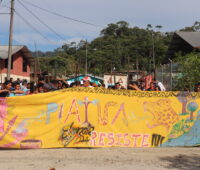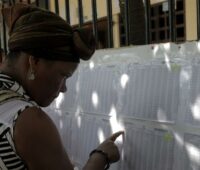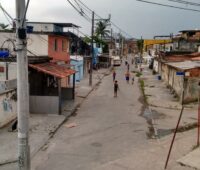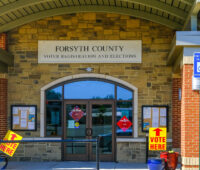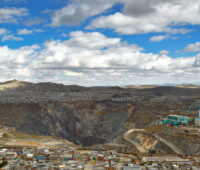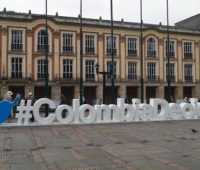In her essay, Karla Mundim examines Indigenous protest movements in Ecuador, focusing on the protests against construction on the Piatua River in the Ecuadorian Amazon. Mundim argues that, despite the enshrining of the prior consultation of Indigenous communities and the "rights of nature" in the country's constitution, Indigenous communities continue to protests and make themselves visible to the state to safeguard their democratic rights.
Can representative democracies be strengthened to govern more effectively? The SSRC’s Anxieties of Democracy program is motivated by a concern about whether the core institutions of established democracies can capably address large problems in the public interest. The “Democracy Papers” highlight and summarize new research presented at conferences and workshops related to the Anxieties of Democracy program. Throughout the SSRC’s history, it has organized and sponsored committees and conferences on democracy, both in the United States and abroad. Most recently, before the Anxieties of Democracy program, the SSRC convened the National Research Commission on Elections and Voting in 2004, culminating in the publication of the report, Challenges Facing the American Electoral System: Research Priorities for the Social Sciences.
If you enjoy the “Democracy Papers,” you may also like our collection of reflection essays on the anxieties of democracy, The Inaugural Democracy Papers. These pieces were collected for the launch of the Anxieties of Democracy program in 2014–15.
Themes


Violence against Women in Politics in Brazil: An Instrument of Power and Anti-Egalitarian Obstruction
by Tássia Rabelo de PinhoHere, Tássia Rabelo de Pinho examines how violence against women in politics manifest in Brazil to the detriment of advancing women's engagement in politics at the national and local levels.

District Selection and Racial Identity: Voting Preferences in the Colombian Congress’ Black District
by Cristina Echeverri-Pineda and Mateo Villamizar-ChaparroDespite the creation of ethnic congressional district meant to increase minority representation, participation in Colombia’s Afro-descendant district has been historically low. Here, Cristina Echeverri-Pineda and Mateo Villamizar-Chaparro examine why Afro-Colombian participation in this district has stagnated and what it could mean for democracy in Colombia.

Nós por Nós: How Community Organizations are Reinventing Democracy in Rio de Janeiro’s Favelas
by Anjuli Fahlberg, Cristiane Martins, Joiceane Eugenia Lopes, Ana Claudia Araujo, Lidiane Santos, Sophia Costa and Guilherme BarathoIn their research, Anjuli Fahlberg, Cristiane Martins, Joiceane Lopes, Ana Cláudia Araújo, Lidiane Santos, Sophia Costa, and Guilherme Baratho examine how democracy is being recreated in Rio de Janeiro’s favelas, particularly Cidade de Deus, where Covid-19 was first recorded. Drawing on their research on the pandemic’s impact on local residents vis-à-vis emergent forms of autonomous governance and how these are shaped by gender and racial dynamics, they argue that civic associations’ mobilization tactics in Cidade de Deus can help us understand how democracy is being reinvented in these spaces under conditions of extreme governmental neglect.

“An Assault on Democracy”: The Effects of Voter ID Laws on Immigrant-Serving Organizations
by Hajar Yazdiha and Blanca A. RamirezFollowing the weakening of the Voting Rights Act in the United States, many Republican-controlled states enacted restrictive voting ID laws aimed at limiting franchise access to communities of color. In their research, Hajar Yazdiha and Blanca Ramirez examine how immigrant-serving organizations in five Southern states recalibrated their resources to help immigrants vote. Focusing on Alabama, they investigate five shifts these immigrant-serving organizations have made to address the impact of voter ID laws, which, the authors argue, shows how these restrictive laws can lead to new forms of organizing and resistance.

Representing Mining Realities: Journalism of the People and Digital Expressions of Democracy on Facebook
by Adela ZhangThe conflict between communities in the Peruvian Andes and multinational mining companies has often been told by national media controlled by elites in the capital of Lima. However, the advent of online livestreams has allowed local communities to make their demands and reveal their circumstances to the public at large. Here, Adela Zhang examines how these popular forms of journalism present a different version of the “reality” of extractive capitalism to the one shown by the mainstream press.

Constituency as an Independent Source of Power
by Michelle Oyakawa, Liz McKenna and Hahrie HanHow can organization leaders make strategic choices that allow them to exercise power in politics? Our book, Prisms of the People, attempts to answer this question by drawing on several case studies of organizations that have won significant victories for their constituencies. In our “prism” metaphor, organizations are the prisms that refract a group’s actions […]

The United States Has a Democracy Problem: What Democratic Erosion Scholarship Tells Us about January 6
by Christina Kulich and Elizabeth Iams WellmanOn January 6, 2021, an organized mob stormed the US Capitol. In this essay, Christina Kulich and Elizabeth Iams Wellman suggest that democratic erosion literature, as studied and taught by the Democratic Erosion consortium, might provide insight into how to understand the events of January 6 as a case study in democratic backsliding. They point out that this insurrection is but one of many antidemocratic disruption events in recent history, finding that the event is a symptom of global, causal trends that include rising inequality, declining trust in institutions, increasing political polarization, and truth decay. Kulich and Wellman argue that liberal democracies are facing a reckoning that may require a redress of systems and institutions so that they are more inclusive, participatory, and accountable.

Covid-19 Could Strengthen Federalism in the United States
by Andrea GustafsonAs part of the annual “Democratic Erosion” undergraduate series, Andrea Gustafson examines what the Covid-19 pandemic reveals about federalism in the United States, in particular changes in the balance of power and responsibility between state-level governments and the federal government. Gustafson finds that, in response to the Covid-19 crisis, governors and state legislatures are taking a more active role, often in opposition to leaders at the federal-level. Noting a trend toward the “nationalization” of United States politics prior to the pandemic, Gustafson argues that “strengthening” federalism may reinvigorate democratic participation at the state level and prevent federal overreach, which may in turn combat democratic erosion.

Disinformation and Democracy: The Colombian Experience
by Jamie HorowitzAs part of the annual “Democratic Erosion” undergraduate series, Jamie Horowitz examines the potential effects of disinformation in Colombia—in particular, disinformation campaigns related to the country’s 2016 peace deal referendum and the 2018 Colombian presidential election. Horowitz finds that well-known politicians are primarily responsible for disseminating disinformation in Colombia, which then circulates unbridled on WhatsApp. Disinformation campaigns, she argues, serve to polarize the population, which, in turn, leads to democratic erosion that manifests in low trust in electoral procedures and government.

